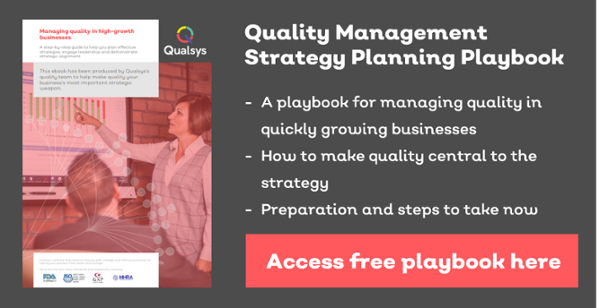Want to contribute to this article?
Opening a site in a new country is every business leader's dream and an undeniable symbol of success.
But it brings with it unprecedented challenges and pitfalls that can quickly turn the international dream into a nightmare.
We spoke to Tejaswini Ranjan in the Hyderabad office of American legal giant Epiq to learn why your quality and compliance team are vital for avoiding the 3 main mistakes businesses make as they move abroad for the first time.

Our expert
Tejaswini Ranjan is a trained lawyer and Legal Associate at global legal services company Epiq.
Tejaswini specialises in eDiscovery, jurisdiction mapping and data regulations. She helps Epiq clients manage their international governance, risk and compliance responsibilities, and is:
- A certified OCEG GRC professional (GRCP)
- Lean Six Sigma White Belt-certified
- AML-KYC compliance-trained
Mistake #1: Not closing the gaps
Tejaswini's first recommendation is to examine how the laws in your target country differ from those in your current territory.
Legal overlap and commonalities are useful time-savers. But gaps, jurisdictional variations and different legal emphases pose challenges and open the door to disputes - so closing any gaps with common training initiatives is a good way to standardise and simplify.
If we are conducting a two-party investigation or contractual review and one party comes from Europe, that party will have GDPR data protection processes.
If the other party comes from India, for example, where we don't have the GDPR, their whole approach to data will be different.
So it's vital for organisations functioning multinationally to get a standard training programme in place so employees know exactly how they should be working.
If one territory is more tightly regulated than the other, use that higher benchmark to bring the other territory to the same level - it's likely that the bar will be raised in the future anyway as pieces of legislation are noted and imitated across the world.
For instance, complying with the GDPR in countries beyond the EU is a good way to prepare as similar data protection laws are rolled out in other territories.
Mistake #2: Product-led expansions (and the costs that come with them!)
It's obvious that you'll need to comply with the legal requirements in your new country.
But not enough businesses lead their expansion with these requirements, instead treating them as an afterthought while spearheading their products into new markets.
And that can cause serious problems down the road as the fundamentals of compliance are forgotten.
There will be some new compliance requirements you can probably meet easily.
Some will be more difficult because you don't have any practical previous experience of how to meet them.
And even if you have some practical idea, the way your business is currently set up might make it difficult to comply, so you can't expand at all.
A thorough research and risk-based analysis project is vital before you make any move - so your quality team, not your commercial team, should be at the cutting edge of every expansion plan.
Tejaswini cautions against a market-first approach after seeing compliance breaches trigger investigations lasting decades:
There have been cases of companies doing anything just to market their products without thinking about ethics or assessing the risks.
Just imagine: an action that took place at one company over a decade ago is still under investigation in 2020.
Organisations need to keep an eye on what their employees are doing, how they are working, and what risks they are posing to the whole organisation.
Stories of mishandled compliance scuppering international expansions aren't difficult to find. In 2006, Walmart's failure to crack labour laws, working ethics and union relations led to a catastrophic $1 billion retreat from Germany.
Mistake #3: Ignoring changes
Even if you successfully extend your operation into another territory in a compliant, structured way, taking your eye off the ball after a few months can be just as damaging as not doing things right the first time.
Tejaswini pinpoints 2 main trends that will dominate international legal compliance for the next decade:
1) Data protection
2) Anti-corruption
As legislatures borrow laws from other countries and use more stringent compliance as a trust-booster to attract foreign business, it's crucial you use your quality and compliance team as your 'eyes and ears' to determine any areas of change and get robust business continuity processes in place for the long run - both to keep up with legal change and unexpected disruptive events.
Once the lockdown is ended, I think the demand for legal consulting will boom.
There are so many companies who were not prepared, who are laying off staff, going bankrupt, wondering whether to move their Chinese operations, who are seeing ransomware and cyber attacks as people work from home without secure systems.
And the whole legal hemisphere is changing. Common law principles are being adopted similarly worldwide.
Your quality and compliance teams should be invaluable internal supporters of your expansion projects, insulating your business from risk and establishing a firm footprint for future success.
A quality-first approach to your international plans will go a long way to stopping your globalisation dream from turning sour.

Further reading
Expanding your business internationally?
Multi-site, multinational organisations require robust processes to adapt to change, manage risk and stay compliant.
Our Quality Management Strategy Playbook sets out guidance to help high-growth organisations prepare their quality management system to go international.









Share your thoughts on this article